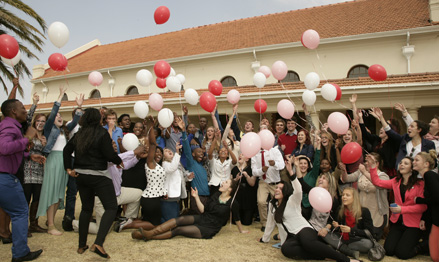Latest News Archive
Please select Category, Year, and then Month to display items
03 January 2020
|
Story Xolisa Mnukwa
|
Photo Supplied
 The UFS Bloemfontein Campus, South Campus, and Qwaqwa Campus choirs are student-centred choirs functioning under the Student Affairs’ Arts, Culture and Dialogue office.
The UFS Bloemfontein Campus, South Campus, and Qwaqwa Campus choirs are student-centred choirs functioning under the Student Affairs’ Arts, Culture and Dialogue office.
It has been a noteworthy year for the University of the Free State (UFS) Choir, establishing itself on the student/university choir scene. The choir, based on the Bloemfontein Campus, represented the UFS at the bi-annual KUESTA choir festival earlier this year, showcasing its musical talent. The choir shared a stage with other university choirs from around the country.
The UFS (Bloemfontein Campus) Choir is a 42-member ensemble of students; the other two choirs, based on the South and Qwaqwa campuses, consist of 40 and 62 members respectively. The choirs are administered and managed by the Division of Student Affairs’ Arts, Culture and Dialogue Office. In addition to Kovsie culture, the choirs strive to have a varied repertoire of inclusive music, with the UFS BFN Campus choir performing a diversity of songs in English, Afrikaans, isiXhosa, and Sesotho.
The new South Campus choir was established in 2018 and is led by choir director, Bonisile Gcisa, who specialises in choral music. This leg of the choir will therefore perform many of his works, but will also include some of the Bloemfontein choir’s set lists, since most of the choir members will be auditioning in 2021 for the Bfn choir when they change campuses.
The Qwaqwa Campus choir will lean more towards a choral genre under the direction of Sipho Khumalo.
The UFS Bloemfontein Campus choir was officially re-established under the leadership of choir conductor Leona Geldenhuys in March 2018, and has performed at several events, including the Rector’s Concert, the annual KUESTA choir convention, and the Bloemfontein Choir invitational. The group has also held a number of public performances on the Thakaneng Bridge at the UFS Bloemfontein Campus.
“Part of the UFS Student Affairs’ objective is to create an inclusive and a socially just student lived experience, and that is the mandate the choirs will also adopt. We hope to create an experience that not only enhances our students’ singing abilities, but also contribute to a more inclusive university experience.” – Angelo Mockie – Director: UFS Student Affairs Arts, Culture and Dialogue office.
“Rest well, be safe, and return rejuvenated,” were his parting words to students for the festive season.
‘Your capacity for change is limitless’
2013-09-13
|
 |
Ready for the world - students taking part in the 2013 Leadership for Change programme getting ready to travel to universities in the USA, Europe and Asia.
Photo: Johan Roux
12 September 2013 |
“You will change this campus, city, country, continent and the world, because you have the capacity for greatness,” Prof Jonathan Jansen, Vice-Chancellor and Rector of the University of the Free State (UFS), said.
He addressed the 2013 group of first-year students in the Leadership for Change programme at a farewell function before they will leave for universities abroad. The first 104 students from the 2013 total of 144 will depart on 18 September and return on 3 October 2013. The second group of 40 students will be abroad from 11 to 25 January 2014. The students are from the Bloemfontein and Qwaqwa Campuses. They will be accompanied by mentors from the UFS.
The students will visit 17 universities in the USA, Europe and Asia.
The first 71 first-year students in the Leadership for Change programme were sent abroad for two weeks in September 2010 to get intense exposure to the academic, social, cultural and residential lives of students in the USA. In 2011 the student number more than doubled and universities in Europe were included. In July 2012 the programme brought students from around the globe to the UFS for the Global Leadership Summit.
Prof Jansen inspired the young leaders, saying, “If you learn leadership values in your four years of study, a change will come. Build the new value system and take it into the country. Your capacity for change is limitless.”
He encouraged them to learn to know the stranger, not only abroad, but also the beggar at the street corner. “Learn to be comfortable with the beggar, as well as with the professor in the classroom.”
A stringent evaluation and training programme preceded the group’s visit abroad, and Prof Jansen could not formulate their achievement better: “I cannot tell you how proud I am of you.”